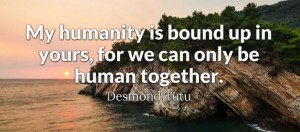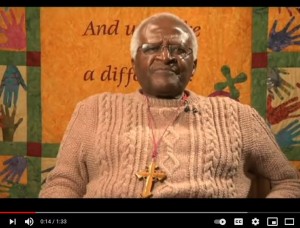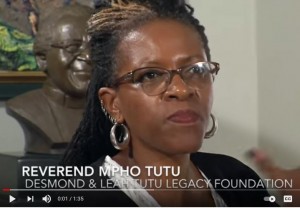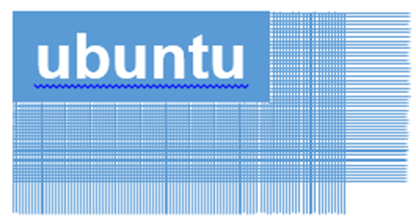Happiness is a how; not a what. A talent, not an object.
– Herman Hesse |
UBUNTU: Building Social Fabric
 Ubuntu
Ubuntu
pronounced: oo – boon’ – too
Is it an operating system? YES!
It is a new operating system for computers (see below); but humans have been using this operating system for thousands of years.
UBUNTU is a sub-Saharan philosophy that recognizes the interdependence of life.
Desmond Tutu tells us: “There is no such thing as a solitary individual. A person is a person through other persons.”
Nelson Mandela said: “Ubuntu acknowledges both the right and the responsibilities of every citizen in promoting individual and societal well-being.”
Here are a few videos from Archbishop Desmond Tutu to orient our understanding:
 A Brief Description * Intro from Semester at Sea * The Essence of Being Human
A Brief Description * Intro from Semester at Sea * The Essence of Being Human 
And from Reverend Mpho Tutu as well ->
Desmond Tutu has also said: “Africans have a thing called ubuntu. We believe that my humanity is caught up, bound up, inextricably, with yours. When I dehumanize you, I dehumanize myself. The solitary human being is a contradiction in terms. Therefore, you seek to work for the common good because your humanity comes into its own in community, in belonging.”
An Ubuntu Lesson:
There was an anthropologist who had been studying the habits and culture of a remote African tribe.
He had been working in the village for quite some time and the day before he was to return home, he put together a gift basket filled with delicious fruits from around the region and wrapped it with a ribbon. He placed the basket under a tree and then he gathered up the children in the village.
The man drew a line in the dirt, looked at the children, and said, “When I tell you to start, run to the tree and whoever gets there first will win the basket of the fruit.”
When he told them to run, they all took each other’s hands and ran together to the tree. Then they sat together around the basket and enjoyed their treat as a group.
The anthropologist was shocked. He asked why they would all go together when one of them could have won all the fruits for themselves?
A young girl looked up at him and said, “How can one of us be happy if the others are sad?”
![]() For ubuntu™, the computer operating system (an alternative to Microsoft and Macintosh) click on the logo or the link: www.ubuntu.com/about. From the website: We bring the spirit of Ubuntu to the world of computers and software by delivering free software, freely, to everybody on the same terms. Whether you are a student in India or a global bank, you can download and use Ubuntu free of charge.
For ubuntu™, the computer operating system (an alternative to Microsoft and Macintosh) click on the logo or the link: www.ubuntu.com/about. From the website: We bring the spirit of Ubuntu to the world of computers and software by delivering free software, freely, to everybody on the same terms. Whether you are a student in India or a global bank, you can download and use Ubuntu free of charge.
What Is Ubuntu?
We found this definition of Ubuntu at https://thehurt.wordpress.com/2010/06/30/ubuntu/
“Ubuntu” is what it means to be human. A Zulu maxim provides perhaps the simplest definition of Ubuntu: “umuntu ngumuntu ngabantu,” which means “a person is a person through other persons.” It is a philosophical belief that being human means recognizing and respecting the humanity of others. As Archbishop Desmond Tutu said, “It is the essence of being human. It speaks of the fact that my humanity is caught up and is inextricably bound up in yours. I am human because I belong.” Tutu goes on to say, “Ubuntu speaks particularly about the fact that you can’t exist as a human being in isolation. It speaks about our interconnectedness. You can’t be human all by yourself.” It is, he says, the relationships between us that make us truly human.
It is not an uncommon philosophy. English poet John Donne, in “Meditation XVII,” opined that “No man is an island, entire of itself; every man is a piece of the continent, a part of the main,” noting, as Tutu does, that being human means you are part of a greater whole. Immanuel Kant, in Groundwork on the Metaphysic of Morals, writes that all persons should “Act in such a way that you treat humanity, whether in your own person or in the person of any other, never merely as a means to an end, but always at the same time as an end.” By treating others not as objects, but as people, we not only respect them, but respect and affirm our own humanity and the ways in which we are bound to one another.
As many people know Fair Shake stands firmly on the philosophy of Ubuntu. We Sign off on our correspondence with it and we end our phone calls with each other by saying Ubuntu.
Many people have written in asking what does Ubuntu actually mean? so we decided to dedicate this page to sharing what Ubuntu means.
This African proverb reveals the true meaning of community.
It reminds us of our humanity and encourages the extension of that humanity to others.
UBUNTU: Building Social Fabric
When I present Fair Shake in both state and federal institutions around the country I hear a lot of incarcerated people hoping to connect and consult with those who have gone through the transition back into society successfully.
I also hear many incarcerated people expressing an interest in giving back to the community, frequently with the hope to guide youth away from the path that leads to prison.
Fair Shake believes these desires, and many more, (including supporting children of incarcerated parents, creating safer communities, and building relationships between seemingly disparate communities) are best addressed by working together, intentionally and carefully building a strong social fabric.
This is difficult today because, as Americans, we are encouraged to believe that we are in the land of opportunity and that to be successful we need to ‘pull ourselves up by our bootstraps’ and ‘do it yourself’. Our culture is suffering from a staggering number of social challenges that are very difficult to recognize or address on an individual basis. We are daunted by the magnitude of effort required to improve how we live together in society and feel we need experts or elected representatives to improve our quality of life. While we wait for them to ‘fix’ the ‘broken system’ we sheepishly accept a steady increase levels of anti-social ailments: depression, social anxiety, mental illness, physical illnesses created by stress, fear, addictions, loneliness, and many more.
Unfortunately, we will never find the solutions by addressing the symptoms alone; what we need is to realize that we need each other and must build a better future together.
We need not look backward, however, beyond recognizing and owning how we got to where we are to avoid going there again. What we need to do right now – wherever we are – is to reflect, study, converse, and collaborate TOGETHER to conjure and create solutions to our challenges.
Once we realize that we need to build ourselves (rather than waiting for some governmental repair person to fix our problem), we can begin the powerful and enriching hard work of improving our listening skills, our communication skills, and our compassion while developing a deeper understanding of what a healthy society within a democracy looks like. Soon, we will begin to problem solve and create more of what we want to improve everyone’s quality of life! (Okay, ‘soon’ is a relative term, but we can’t let that hinder us. ~ : )
To encourage people to see a more empowering picture, I consulted with the author of The Business of Belief, Tom Asacker. He reminded me that we are not motivated by logic; that we shift our beliefs based on our experiences and feelings and, most importantly, that we need a clear picture of where we can go to move to another path. When we change our belief of what is possible, we can change our attitude and approach to solving our problems, which will change our behaviors and, eventually, our lives.
After consulting with family members, colleagues, and anyone who will listen, Fair Shake is presenting this series of images for your consideration.
We hope you will share your thoughts on what you see below. We are currently developing, with incarcerated, formerly incarcerated, and never incarcerated people, ways to build out this vision. Your opinion is important!
Your creative skills are important, too! We need to make this a story that we can share and use to stimulate others. We also need to create a flowing image from the individual to the social fabric.
If you see where you would like to contribute – even if your contribution is to critique our present work or to look ahead to where it might not work down the road – please contact us!
We’re looking forward to building the future with you! Ubuntu!!
Fair Shake view of building social fabric: (view from overhead)
![]() One person, arms outstretched, ready to connect with others to build community strength and to demonstrates prosocial understanding and interest through engagement.
One person, arms outstretched, ready to connect with others to build community strength and to demonstrates prosocial understanding and interest through engagement.
![]() Two people, strongly connected to each other,
Two people, strongly connected to each other,
 The clasp builders use: a ‘rescue’ hold, for optimal strength.
The clasp builders use: a ‘rescue’ hold, for optimal strength.
 People supporting each other inside begin to build the reentry safety net. Some builders may not go home for a long time, some may not be coming back to society at all, but we must acknowledge and honor our connection. We can be aware of our strength as an individual as well as the strength of the group: the whole is greater than the sum of its parts. As people go home from prison, the net flows from the inside to the outside…
People supporting each other inside begin to build the reentry safety net. Some builders may not go home for a long time, some may not be coming back to society at all, but we must acknowledge and honor our connection. We can be aware of our strength as an individual as well as the strength of the group: the whole is greater than the sum of its parts. As people go home from prison, the net flows from the inside to the outside…
 For those who do come home, once they are safe, or feel they are in a position to give, make themselves available for those who are coming home now… (over 1700 people come home every day). What starts as a safety net for the reentering community then weaves naturally into building and repairing the social fabric
For those who do come home, once they are safe, or feel they are in a position to give, make themselves available for those who are coming home now… (over 1700 people come home every day). What starts as a safety net for the reentering community then weaves naturally into building and repairing the social fabric
ubuntu: a society that recognizes and embraces interdependence, cooperation, and compassion.
A society that seeks safe communities and ‘United We Stand’ strength, must vigilantly review how it cares for all members.
The Pillars of Ubuntu Living
The following is an excerpt from an article “UBUNTU (African Wisdom on How to Be a Human Being) PART2” found on the web page “Mind Power with John kehoe: You Create Your Reality.”
click here to read more: http://www.learnmindpower.com/articles/ubuntu-african-wisdom-how-be-human-being-part2/
Let’s examine some of the pillars of Ubuntu living:
-
Caring: Caring is embracing others. Their needs become your needs. Their joys and sorrows become your joys and sorrows. It is the practice of concern and oneness, which Jesus expressed as “Love thy neighbor as thyself.” It is putting the problems, interests and circumstances of others at a higher level of attention. For as Ubuntu teaches, “we are human through our interaction with others. Without others we are not human.” From this perspective we should welcome our interaction with others regardless of whether they are pleasant or not, for all interactions allow us to express our humanness.
-
Empathy: Empathy is the ability to successfully enter into the emotional situation of another, to listen and feel genuine sympathy because you hear and feel what others share with you. You listen with your mind but you also feel with your body, and this feeling allows you to “see” the situation from a deeper perspective. When we cultivate the practice of empathy it deepens us and gives us access to more humanness with which we can help others.
-
Sharing: In the Ubuntu culture it is normal to share generously with others. “Mahala” is the traditional African practice that teaches that it is proper to give to others without expecting anything in return. Not everything needs to be done for money or gain. You work to support your family and if you prosper you share with others. Even if you don’t prosper you must share because there is always someone else worse off than you. By sharing you express your humanness and find joy within because you awaken your heart. Heartless people have no joy, though they might have riches. People with heart have joy because they have discovered their humanness. To discover your humanness is to discover something great, a treasure unlike any other. Each day of our life gives us opportunity to discover and practice our humanness.
-
Respect: Respect covers many things. Respect for elders, children and all members of your community, respect for your ancestors, traditions, the ancient teachings and practices. Respect for oneself, for if one does not respect oneself how can one respect another? Respect for your environment and all living creatures. Respect for the Ubuntu way of life as a way to happiness and self-awareness.
A human being from an Ubuntu perspective should be kind, generous, friendly, living in harmony with himself, the environment and others, and at one with the creator. “This is what Africa can teach the world,” said Credo Mutwa, the respected Zulu Sangoma, “We have forgotten how to be human beings, and we must remember quickly if we are to save the world. Life is an instrument and we have lost the ability to play it. People live but they are not alive. We must use life and play it like an instrument and make beautiful music.”
Why is Ubuntu important?
The problems that we face as a community can only be solved as a community…
We don’t have to look very far to answer this question, but we can close our eyes and point to anywhere on the Globe and the issues surrounding the lack of true humanity can be seen. This is especially so here in America where it is common to label and disregard others who do not fit into our social or ethnic group.
If the philosophy and practice of Ubuntu was prevalent there wouldn’t be much time to hurt each other, because we would be too busy working and building our communities.
The practice of Ubuntu is a conduit that exemplifies humaness, and reminds us that we’re all connected. With all the separators that are constantly brought to our attention it would serve us well if we could gather around the commonalities that we share, the things that connect us as human beings. Ubuntu allows us to unite in spite of our differences, rather that allow individuality, culture and other possible divisors to separate us. It puts the focus on the community, who we are together. It allows us to see the human being first.
Ubuntu means having respect for other people regardless of their color, race or creed; to care about others; to be kind to others on a daily basis regardless of their position in life. it means being considerate of others; being compassionate towards others; and making a difference one small gesture at a time, that could be a smile or a good morning even.
One of the hardest things in the world to do is to change our minds, especially when it comes to deeply rooted beliefs.. unfortunately, when it comes to our society today the air of competition and the “I have to get mine” attitudes are very prevalent. In order to truly exist as a community in the spirit of Ubuntu those philosophies have to be set aside in the name of the greater good. this does not mean that an individual cannot prosper on their own. It simply means that one’s prosperity doesn’t have to include stepping on some one else to attain that prosperity. it’s recognizing that we are all connected and if i step on the next person i am inevitably stepping on all of mankind, which includes myself.
It will take a changing of the way we generally do things in order to overcome the challenges we now faces a nation. It is not one individual that can turn the tides it will take a collaborative effort that includes introspection and sacrifice in the name of co-existence.
Thew separation that we experience as individuals and groups is something that we’ve created and anything that we have created we can put asunder. The wars, hunger, poverty, and hatred that is openly experienced by us all doesn’t have to be our reality. Whether you’re sitting in a prison cell or in a big house on a hill you can make a difference by choosing to view things differently than we all have been. Ubuntu can be practiced regardless of social status or any other socially constructed views, however the choice has to be made.
Ubuntu embodies values that are critical to our existence!
Ubuntu In Practice
We found the following article about ubuntu at: https://thehurt.wordpress.com/2010/06/30/ubuntu/
Ubuntu is not a religious belief. Ubuntu is an underlying belief – it provides the “why” for actions that we all know to be good and just. By recognizing that we are all persons only through other persons, that I am human only because of the humanity of others, and that humans are intrinsically interconnected, I have a reason to treat others with respect. I have a reason to be affirming of others. I have a reason to be kind and welcoming and generous. It is this concept of Ubuntu that gives us the motivation to become real human beings and to treat others as such. Ubuntu gives us validation in our mission to accept responsibility, lead courageously, have empathy, enact justice on behalf of others, and work for a transcendent cause. Ubuntu is knowing what it means to be truly human.
The concept of Ubuntu on respecting and uplifting the humanity of others gives one a sense of accountability to oneself while having compassion and caring for others. By applying Ubuntu we can change the world one act at a time.
Think about what Ubuntu means to you personally, apply this wonderful ethic to your own life on a daily basis and find ways that you can make a difference in this world.
Ubuntu personality values:
- togetherness (umoya)
- brotherhood (ubuzalwane)
- equality (ukulingana)
- sharing (isabelo)
- sympathy (isisa)
- empathy (uzwela)
- compassion (umunyu)
- respect (ukuhlonipha)
- tolerance (yeka)
- humanness (ubuntu)
- harmony (ubungane)
- redistribution (ukwabelwa)
- obedience (ukulalela)
- happiness (singcolile)
- wisdom (ubudoda)
according to DR JOHANN BROODRYK
Community Building
We found the following community building information at:
http://www.socialmediaexaminer.com/build-a-social-community-4-tips/ and
http://www.community4me.com/communitybldg1.html
The concept of community is based on how people gather around shared interests or location to give and take mutually. This has not always applied to business.
A lot of the communities in place today have grown through social media. These tools not only allow communities to connect face to face, but also to connect much faster on deeper levels. Social media allows people to gather regardless of geography into a community of shared ideas.
#1: Find Your Advocates
As a community manager, it’s essential to find advocates for your brand and recruit new members to your social community. All members (and even those who are not yet members) have the potential to be advocates—it just requires some attention.
Some fans will jump out at you: They’re the ones who constantly share, like, comment, favorite and tweet. Reach out, reply and let them know they’re valued members of your social community. Ask them to invite friends to stop by your social pages.
The direct approach is time-consuming, but effective.
However, there are other more direct methods of research. This one involves finding fans on other networks and letting them know about your community.
One tool to use to find out where your online audience is currently hanging out is Mention. Mention allows you to track specific keywords in real time, anywhere on the web. This is helpful for both content and audience discovery.
1. Will This Work?
Honestly, we don’t know. Many ideas run by us have been terrific ones that have fizzled and others that seem a remote possibility then take off and go on to phenomenal success. While the idea is important, knowing your members and what they may want/need is more so. So we advise you to interview as many members of your potential community to get feedback on the idea. Share the high level idea and then listen, really listen. While you need to hear what the critics and naysayers have to say, you can also combat hollow enthusiasm with requests for people to get involved and spend actual time being part of the new community. Combine interviews with potential members with a look that the target members information and social environment – that will tell you a lot about whether resources to address their needs are already available and how unique your concept is.
2. Become a Valued Resource and Share Content
People join a site for the content, but they stay for the community – something we often say at TheCR. Before there is a community there needs to be a reason to show up. Begin to curate and create content around the space/industry you are targeting. Once you have content written by others weigh in yourself and ask those that you talked to in step 1 to as well. Be vocal in the space. Not shamelessly self-promotional, but involved enough that your name/community name gets out there as a trusted resource for quality information.
3. Experiment, Experiment, Experiment
In this stage of community development there are are almost no hard and fast right or wrong answers. And what works week 1 may seem like an abject failure week 22 – and vice versa. This is exactly the right time to use trial and error. It’s how you learn who your community is, what engages them and what community culture is emerging. Any “failures” at this stage are actually important learning milestones. Experimentation is an extremely important part of building and sustaining a healthy, strong community.
4. What’s Your Bottom Line?
We don’t mean come up with a budget, although that is important too. What we mean is you need to understand the business model. Is this supposed to be a labor of love, a cost center or a revenue generator? Will your community support that? One way to figure this out is to ask yourself what your goal is for this community. If it’s a side project/hobby that’s great, but if you need to keep the lights on, be sure to examine how that will happen carefully. And also ask yourself if you have enough runway to support those goals. Meaning how long can you go without making money or justifying the cost? If this is a labor of love, how long in to the future do you see sticking with this? How much time can you devote to it? Consider the end before you begin and what might trigger it.
All these questions and considerations will help you understand if this will work for you.
Building a Community Strategy
We found the following on building a community startegy at:
https://www.communityroundtable.com/community-101/building-a-community-strategy/
Are you just getting started and looking to build your community strategy? We recommend using the Community Maturity Model to help in building a community strategy. Below are some of the primary tasks related to each competency of the CMM:
Strategy
- Define the business objective
- Articulate the community purpose, from the members’ perspective
- Assemble research to help build your business case
- Complete competitive audit – what competes for members’ attention?
- Build a business case
- Calculate and secure investment required
Leadership
- Find or develop executive sponsors
- Determine what executive and stakeholder education is necessary
- Calculate and secure investment require
Culture
- Articulate cultural limitations and opportunities
- Assess willingness and aptitude for change
- Determine if specific training or change management initiatives are needed
- Calculate and secure investment required
Community Management
- Understand the community management approach needed, based on business objective and member characteristics
- Define roles and responsibilities
- Calculate and secure investment required
- Assign roles and responsibilities
Content and Programming
- Define content and programming needed to reach the business objective
- Determine gaps in available and required content and programming
- Calculate and secure investment required
Policies and Governance
- Assess current policies
- Amend or develop policies as needed
- Audit current governance – or lack thereof – of social media and collaboration environments
- Develop a governance model
- Calculate and secure investment required
Tools
- Determine required tools – software, applications, templates, and guides
- Audit current toolset
- Calculate and secure investment required
Metrics and Measurments
- Articulate primary value that will enable business goal
- Articulate secondary value
- Determine metrics for executives, operational management and tactical management
- Assess ability to capture metrics
- Build capacity to capture metrics, as needed
- Calculate and secure investment required
Additional perspectives on the value of community
The Basics of Strategic Planning and Strategic Management, Balanced Scorecard InstituteOnline Community Strategy Framework, Lauren DeLongOnline Community: Heart of Social Strategy, LithiumThe Ultimate Framework for Planning an Online Community Strategy, Socious<



